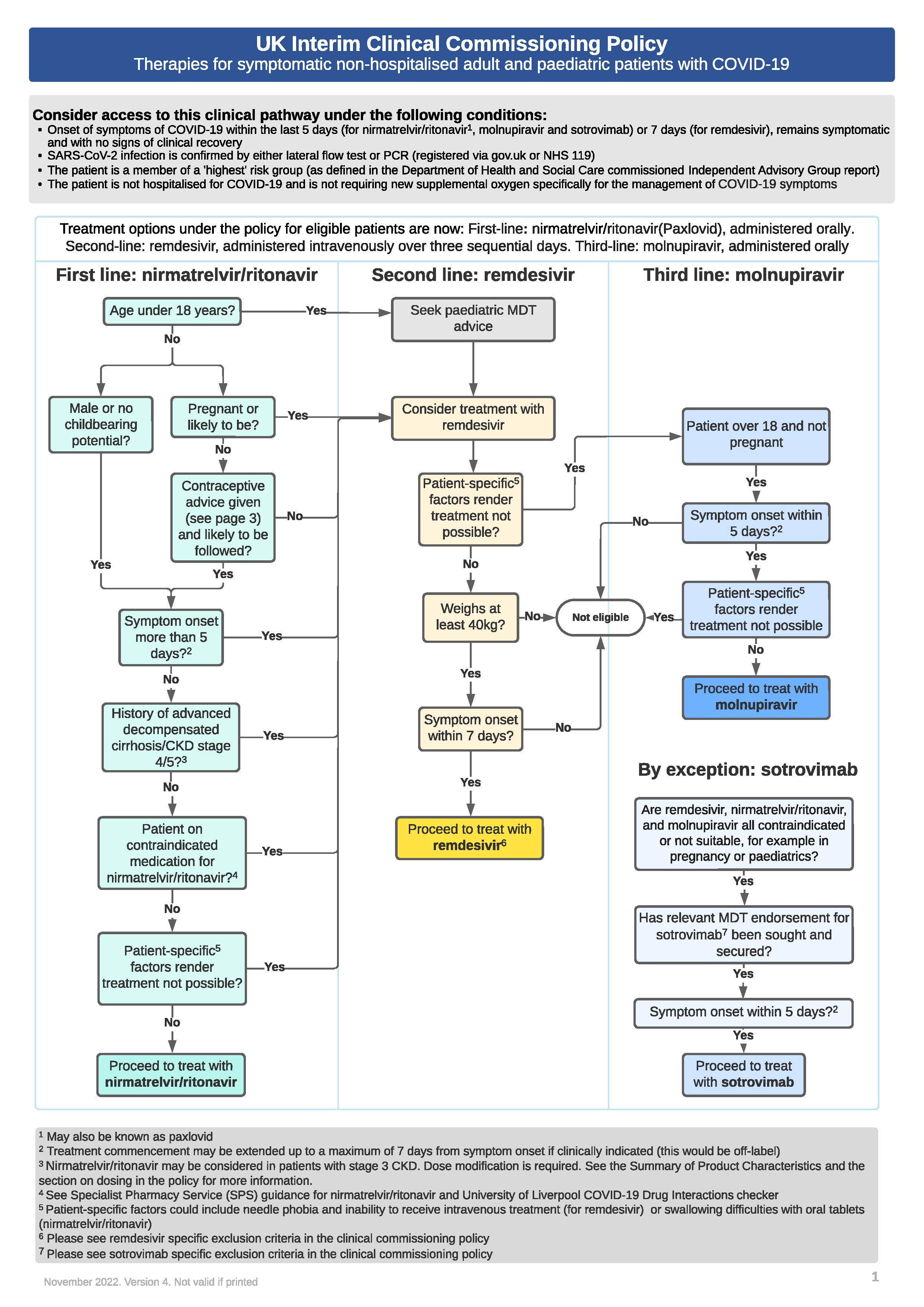Please refer to the summary of product characteristics for nirmatrelvir plus ritonavir, Paxlovid®), remdesivir, molnupiravir and sotrovimab as published on www.medicines.org.uk/emc website.
Nirmatrelvir plus ritonavir (Paxlovid®)
There is a risk of serious adverse reactions due to interactions with other medicinal products (see https://www.covid19-druginteractions.org/checker).
Nirmatrelvir plus ritonavir (Paxlovid®) is a CYP3A inhibitor so co-prescription with other drugs metabolised by the same pathway may increase or decrease concentrations of nirmatrelvir plus ritonavir (Paxlovid®) or the co-prescribed drug.
These interactions may lead to:
- Clinically significant adverse reactions, potentially leading to severe, life-threatening or fatal events from greater exposures of concomitant medicinal products.
- Clinically significant adverse reactions from greater exposures of nirmatrelvir plus ritonavir (Paxlovid®).
- Loss of therapeutic effect of nirmatrelvir plus ritonavir (Paxlovid®) and possible development of viral resistance.
Hepatic transaminase elevations, clinical hepatitis and jaundice have occurred in patients receiving ritonavir. Therefore, caution should be exercised when administering nirmatrelvir plus ritonavir (Paxlovid®) to patients with pre-existing liver diseases, liver enzyme abnormalities or hepatitis. Patients should be advised of possible gastro-intestinal side-effects of treatment - anti-emetics that are not contra-indicated may be considered.
Remdesivir:
Hypersensitivity reactions including infusion-related and anaphylactic reactions have been observed during and following administration of remdesivir. Signs and symptoms may include hypotension, hypertension, tachycardia, bradycardia, hypoxia, fever, dyspnoea, wheezing, angioedema, rash, nausea, vomiting, diaphoresis, and shivering. Slower infusion rates, with a maximum infusion time of up to 120 minutes, can be considered to potentially prevent these signs and symptoms. Patients should be monitored for hypersensitivity reactions during and following administration of remdesivir as clinically appropriate. If signs and symptoms of a clinically significant hypersensitivity reaction occur, administration of remdesivir should be discontinued immediately and appropriate treatment initiated. Patients receiving remdesivir in an outpatient setting should be monitored according to local medical practice.
Molnupiravir
The most common adverse reactions (≥1% of subjects) reported during treatment and during 14 days after the last dose of molnupiravir were diarrhoea (3%), nausea (2%), dizziness (1%) and headache (1%) all of which were Grade 1 (mild) or Grade 2 (moderate).
Sotrovimab
Hypersensitivity reactions, including serious and/or life-threatening reactions such as anaphylaxis, have been reported following infusion of sotrovimab. Hypersensitivity reactions typically occur within 24 hours of infusion. Signs and symptoms of these reactions may include nausea, chills, dizziness (or syncope), rash, urticaria and flushing. If signs and symptoms of severe hypersensitivity reactions occur, administration should be discontinued immediately and appropriate treatment and/or supportive care should be initiated. If mild to moderate hypersensitivity reactions occur, slowing or stopping the infusion along with appropriate supportive care should be considered.

